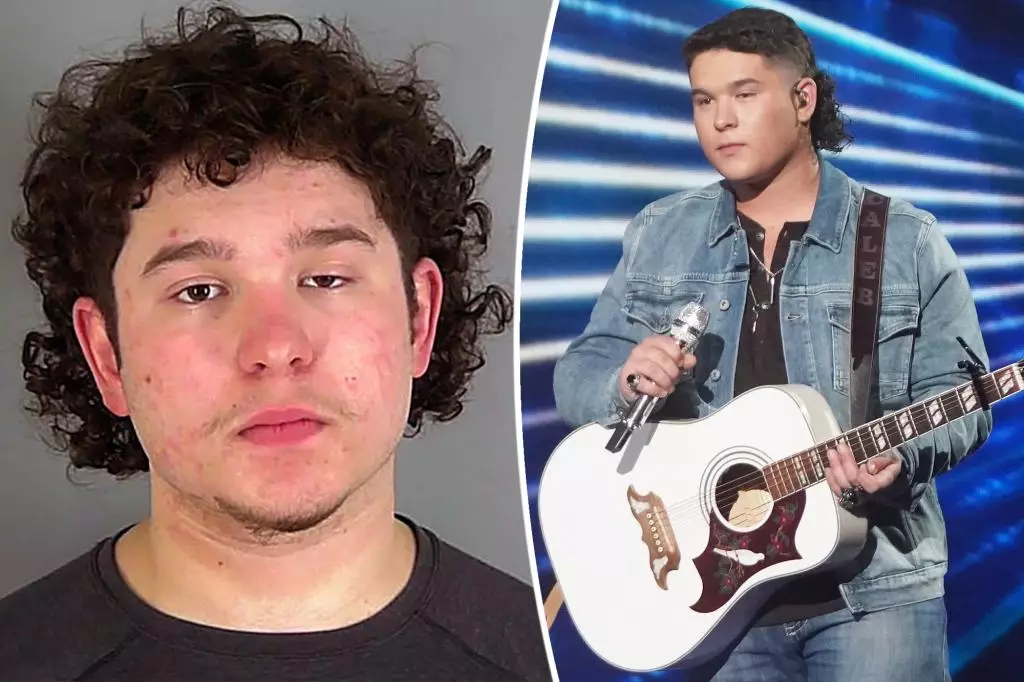The tragic fate of Caleb Kennedy, a former contestant on “American Idol,” serves as a stark reminder of the potential consequences of reckless behavior. At just 20 years old, Kennedy has been sentenced to eight years in prison following a deadly car crash, a situation that could have been avoided. Despite the gravity of the circumstances, public sentiment surrounding his sentencing raises important questions about justice, accountability, and the complexities of youthful mistakes.
The events that led to Kennedy’s sentencing date back to February 8, 2022, when he was involved in a collision that claimed the life of 54-year-old Larry Duance Parris. Reports indicate that Kennedy was under the influence of both marijuana and prescription medications at the time of the accident. He struck Parris, who was distracted by a phone call, pushing the victim into a building. The consequences were immeasurable; Parris succumbed to his injuries at a nearby hospital, leaving behind a grieving family.
Kennedy’s irresponsible choice to mix substances on a day that initially held no tragedy is a dark example of how quickly a life can change. The young singer was arrested immediately and charged with driving under the influence (DUI), a move that ultimately altered the course of his life and the lives of those around him irreparably.
Legal Proceedings: Reactions and Sentencing
Initially met with a much harsher sentence of 25 years, Kennedy’s punishment was later reduced to eight years, reflecting the nuances and specifics of his case. His attorney, Ryan Beasley, argued that Kennedy was a minor at the time and had no prior record. This plea for leniency, coupled with the acknowledgment of a “weird reaction” from his medication, reveals a complex legal landscape often seen in cases involving young individuals. While some may perceive this as an inadequate response to the loss of life, it underscores a larger debate on punitive measures versus rehabilitation for young offenders.
Moreover, the emotional toll on the victim’s family must not be overlooked. They sought the maximum sentence, driven by grief and an understandable desire for justice. The contrast between their pursuit and the defense’s narrative raises ethical considerations about the justice system’s response to tragic accidents involving youth. Kennedy’s reduced sentence and the possibility of home detention for part of this time may not sit well with those who view the case through the lens of retribution and justice for the victim.
Caleb Kennedy’s past, marked by a controversial episode while competing on “American Idol,” adds layers of complexity to the narrative. Despite being a top-five finalist, his participation in a Snapchat controversy involving a Ku Klux Klan hood ultimately led to his exit from the show. This earlier incident showcased the pressures of fame and the public’s rapid judgment of the individual’s actions. When Kennedy later had to apologize for appearing in that video, claiming he did not understand the implications at the time, it set a precedent for his later behaviors and decisions that culminated in tragedy.
Kennedy’s prior actions and attempts at reformation reveal a young individual grappling with the consequences of decisions made in the heat of youthful indiscretion. Many public figures have faced scrutiny for past behaviors, prompting discussions about redemption and change. However, change must also be met with accountability; this duality is what his case embodies—a struggle between the desire for personal growth and the need for justice.
As Kennedy prepares to serve his sentence, the implications of his actions extend beyond his individual case. It propels a conversation about drunk driving, mental health, and substance abuse—issues that prevail in many societies, particularly among young adults. The requirement for mental health and substance abuse counseling set forth in his sentence may serve as a crucial step towards transformation for Kennedy, but it also acts as a reminder for others about the repercussions of reckless behavior.
Ultimately, the tale of Caleb Kennedy raises immense questions about youth, the social responsibility of public figures, and the legal system’s role in balancing accountability with the potential for rehabilitation. As he embarks on the next chapter of his life behind bars, both he and society are inundated with lessons: regret is not an adequate substitute for the irreversible loss suffered by victims and families impacted by similar tragedies.

